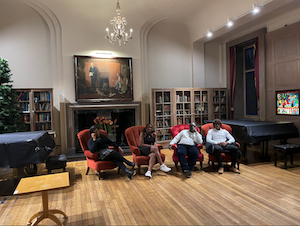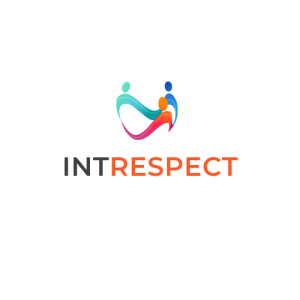By Maxine Thomas-Asante
First posted December 2021.
Last Tuesday I had the honour of graduating as a Master in Science in International Social and Public Policy, from the infamous London School of Economics. Graduation was such an emotional experience representing the culmination of many challenges, aspirations and dreams that it felt necessary to share the experience. Reflecting on my entire journey I wanted to take the opportunity to share: my most enjoyable moments; my biggest challenges; notable achievements; and what this qualification enables me to do.
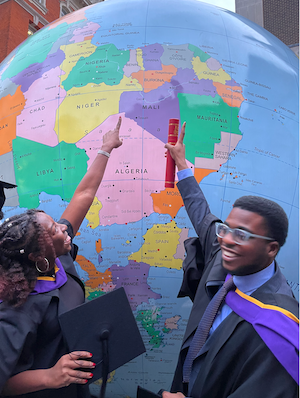
Why Was LSE Such a Big Deal in the First Place?
Before I go on to discuss my experiences, feelings and outcomes it is important to contextualise what matriculating onto this course meant. For my masters I studied International Social and Public Policy, though this course really focused on social policy. I know many of you are still wondering what this means. Succinctly put, social policy is the study of inequalities and welfare states. Due to my interest in education and anti-racism, this course leapt out at me from the moment my eyes read the course description two years ago.
Once I had decided social policy was the course for me, the London School of Economics (LSE) seemed exactly the place I needed to be. For context, LSE is the birthplace of the social policy discipline. Not only did they create the academic subject but they continue to be a world leader in the teaching of this course. Prior to my attending, LSE was ranked second in the world for the teaching of social policy, after Harvard. As such, to study social policy in its birthplace, in a world renowned institution for its study, and in Britain – an architect of the welfare state – was in itself an achievement.
As if I needed another sign, in 2019, I attended an event hosted by the fantastic Professor Coretta Phillips analysing the Macpherson report 20 years on. Inspired by the panellists and Professor Phillips as the host, I was keen to learn from her. Who knew that less than two years on I would be sitting in her Q&A session, in LSE’s Social Policy department asking questions about Black liberation in Britain.
What Did You Enjoy the Most?
The aspect of my masters that I enjoyed the most was honestly the learning. That does seem pretentious but it is the truth. I did my absolute best to watch every lecture, attend every q&a, attend all my seminars and read every piece of literature necessary for preparation. After being a sabbatical officer in the preceding year, I truly appreciated what it meant to be back in the classroom. I also had a newfound appreciation for the work that goes into preparing a class, from the crafting, marketing and delivering of a course. As my Dad puts it, I had ‘caged dog’ syndrome, I was tired of talking about education and I was ready to get back into the classroom and learn.
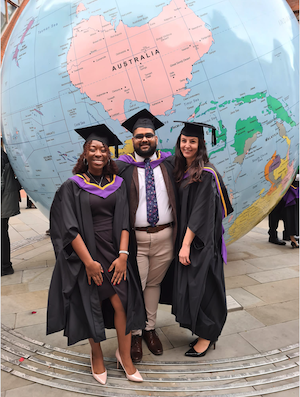
In addition to some truly fantastic learning, I also had the opportunity to apply my learning practically within the LSE. While studying, I worked as a research assistant under Dr Kitty Stewart and Dr Hakan Seckinelgin to analyse the potential for decolonising the curriculum at LSE’s Social Policy department. I was one of four research assistants including Azaan Akbar (photographed centre), Doron Wijker (photographed right), and Harini Natarajan (not photographed). Adopting a very horizontal team structure, we analysed the demographics of authors on reading lists across the department, and proposed practical steps academics could take to both diversify and decolonise their programmes. Our research was deeply theoretical but also practical and proactive; mixing qualitative and quantitative data types to produce rounded findings. This project allowed me to consider how internal research processes are approached in elite higher education institutions, balancing conventional values on quality assurance with the necessary creativity to produce a progressive curriculum. I was grateful that throughout this research project I was listened to and supported. This team dynamic enabled us to test different approaches and develop an evolving methodology.
During this learning journey at the LSE more broadly I met some of the most incredible classmates, colleagues and friends I could have possibly hoped to have made. Of all the highlights I experienced during my time at LSE the inspiring people I encountered were definitely the most significant. Though I won’t go into great detail on this, the Africa Summit contributed hugely to meeting some incredible thinkers actively pursuing Black liberation in the Global North and on the African continent.
What Were Your Biggest Challenges?
Basking in the high of graduation, it is easy to make the bold assertation that everyone should have the opportunity to study in a place like this. However, the reality of elite higher education prevails and an education of this calibre doesn’t come cheap. In order to pursue my aims of attending the London School of Economics, I had to find a way to generate enough money (in addition to the postgraduate loan) to afford my fees and live in London for a year. This led me to launch a fundraiser; and apply for the Black Heart Foundation grant, Chapman Educational Trust grant and the Grant Taylor Educational Foundation Trust. With a considerable amount of help from friends, family and my network, I was able to raise enough money to attend LSE. It is largely this reason I have been so eager to share every stage of my masters because in practice this qualification belongs to many of the people I hope will read this piece.
After completion, it is also easy to forget how difficult I found the year in reality. I studied at LSE during some of the harshest periods of the pandemic. Beginning in September 2020 and submitting my final piece in August 2021, the majority of the year was spent studying online, feeling isolated from my cohort and teachers; and battling an aggressive low mental phases. For extended periods it would be just me and my screen, reading articles, watching pre-recorded lectures, attending question and answer sessions. My screen exposure became so extreme that by the middle of the year, my GP diagnosed me with migraines – a condition I had never experienced prior. In addition to having health implications, the amount of time I had to spend seculded was lonely. As a person who benefits from human contact, the digital replacement simply did not cut it. Despite the struggles of my masters year, it was still one of the most growing periods of my entire life.
Okay, Maxine, we get it. It was tough. Skip to the good part.
What Did You Manage to Achieve?
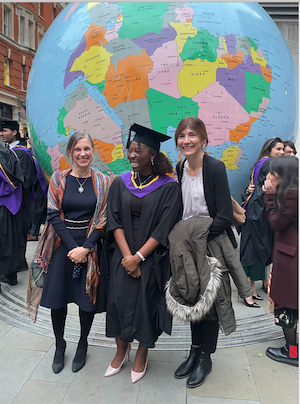
This course prompted some of my most difficult challenges and brightest achievements. I am unbelievably proud to be able to announce that I was awarded not just one, but two prizes for my performance on the International Social and Public Policy Programme. The first award was the Titmuss Award for Outstanding Dissertation 20/21 for my dissertation entitled: ‘To what extent can the Equality Act 2010 be considered a ‘radical’ Act contributing to Black liberation and recognition in Britain.. Considering the risks I had taken in pursuing a dissertation topic that was ambitious, unusual, risky and radical I could not have been happier to see that the dissertation was not only acknowledged but celebrated. The second was the Titmuss Prize for Best Performance 20/21. A recognition I am elated to receive.
***Please find my dissertation posted in my Interactive CV page.
Due to the fact that my long term professional work has challenged racism in education, I am acutely aware of the difficulties Black people face in navigating higher education environments. As such, it has not escaped me that my receiving these awards in an institution like the LSE means an incredible amount. Not only as a Black person, but as a Black British person who is from an ambitious but lower income background. I will always be grateful to God that I was able to attend, successfully complete, and receive prizes for my best performance at such an institution.
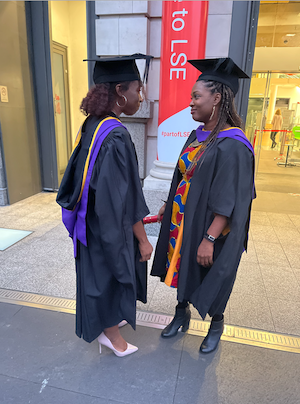
Furthermore, within my department, there are two broad masters degree programmes (with subsidiaries within them). For the other masters degree programme – Criminal Justice Policy – the Best Dissertation prize was joint. The prize was shared between a great Dutch thinker – Donatella – and a wonderful Trinadadian barrister called Danielle (pictured right). What struck me about Danielle was the tenacity but also the risk and boldness that it took for her to attend the LSE. Leaving her young son at home to improve their future, I will always be in awe of the sacrifice that Danielle demonstrated. I will also always be grateful for the sisterhood, support, advice and encouragement she offered me throughout our programmes.
The awards and recognition I received meant even more due to the happiness of my family. Their encouragement has been a life force and I could not be more grateful for their continued support. Upon hearing the news of the prize, my Aunty messaged me “congratulations Maximuss Titmuss” before realising that phrasing sounds as if I have really big… Never mind.
What Can I Do Now That I Couldn’t Before?
So, what am I enabled to do now that I could not do before?
1. I have tested my ideas
This course truly allowed me to test the practicality of my ideas and ideals. I was routinely asked not only what the solution to a particular social issue was, but also how we practically realise the solution. Learning to balance my ideals with a better understanding of the internal processes of formal institutions and the values contained therein, became invaluable.
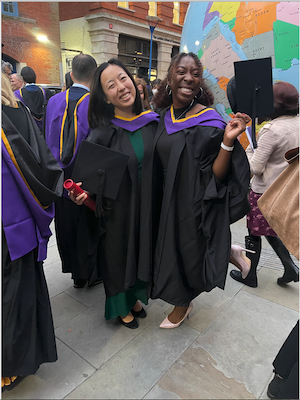
2. The confidence instilled from an elite institution
Studying at an institution that has produced so many world leaders built in me the confidence to believe that the ideas I do have can meaningfully contribute to creating a better world. Not only have I had the ability to test my ideas but I now have the belief that I can implement them in the appropriate spaces to truly impact our world, and build a better tomorrow.
3. The assuredness to take risks
As a result of both the testing of ideas and the LSE confidence, I have been emboldened to take risks that I may otherwise not have. Most centrally, this has taken the form of launching an anti-racism consultancy named IntRespect, with my business partner Myles Smith-Thompson. Though we are in the early stages, it is clear that change is needed with regards to the way racism and anti-Blackness is approached in Britain. We aspire to contribute positively to this national conversation, and pursue radical change at the institutional level.
Thank you
Thank You
Coming to the end of my masters and officially graduating has been a moment of intense reflection. My core conclusion has been that this recognition belongs to all of us: my family and my community.
I want to take this opportunity to thank everyone who has supported me over the past two years in the pursuit of this masters. Thank you for contributing financially so that I could even complete this degree. Thank you for making sure I was eating, and for checking on me in one of the most difficult periods of my life. Thank you to everyone who believed in and encouraged me. I could not have done it without you.
Most importantly, thank you to my support network – some members of which are photographed here in the Shaw Library (Founders Room) at the London School of Economics. Looking as comfortable as we should be in a seat of learning, in an elite institution in the heart of London. We were not the first and we certainly should not be the last.
